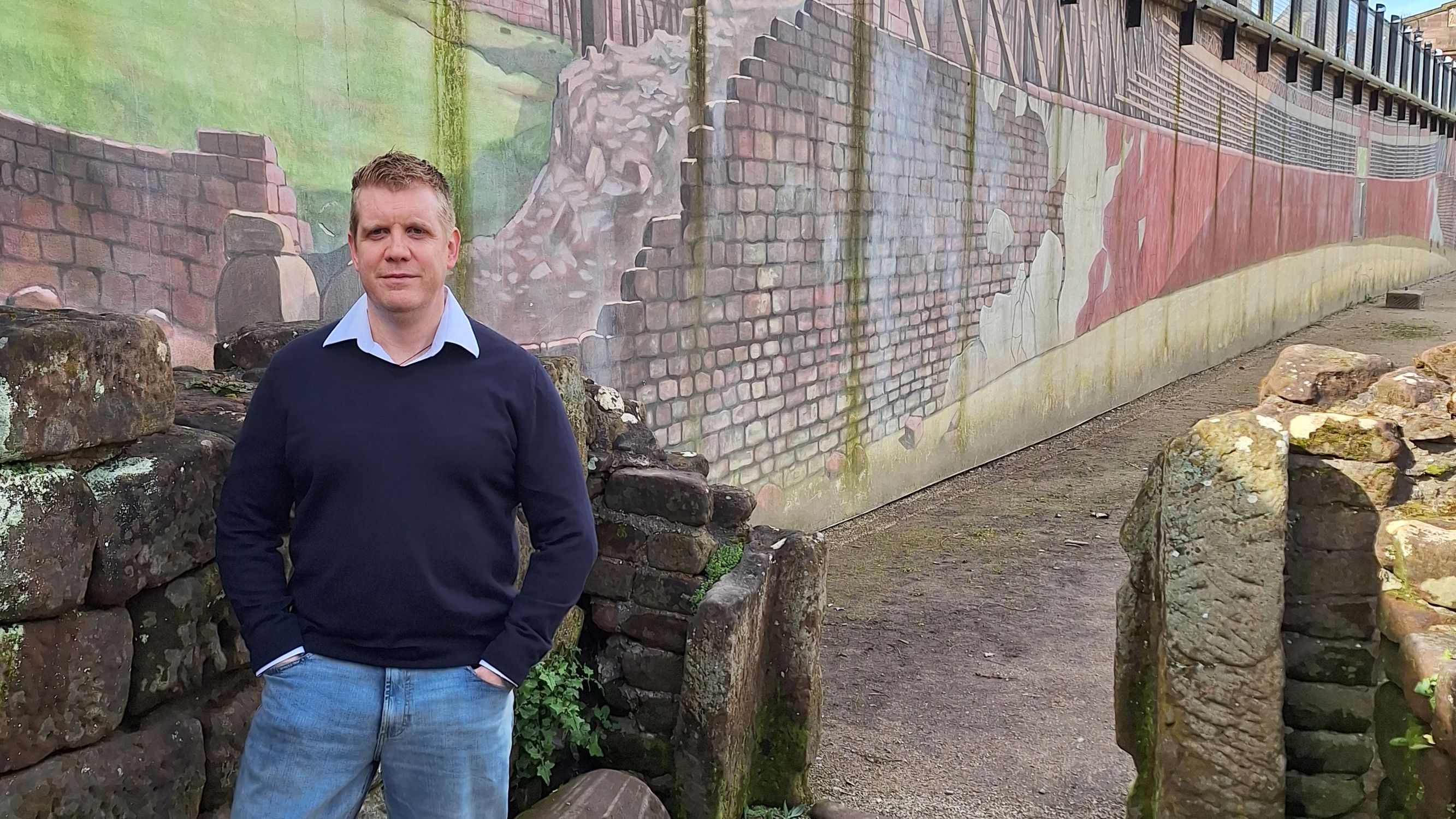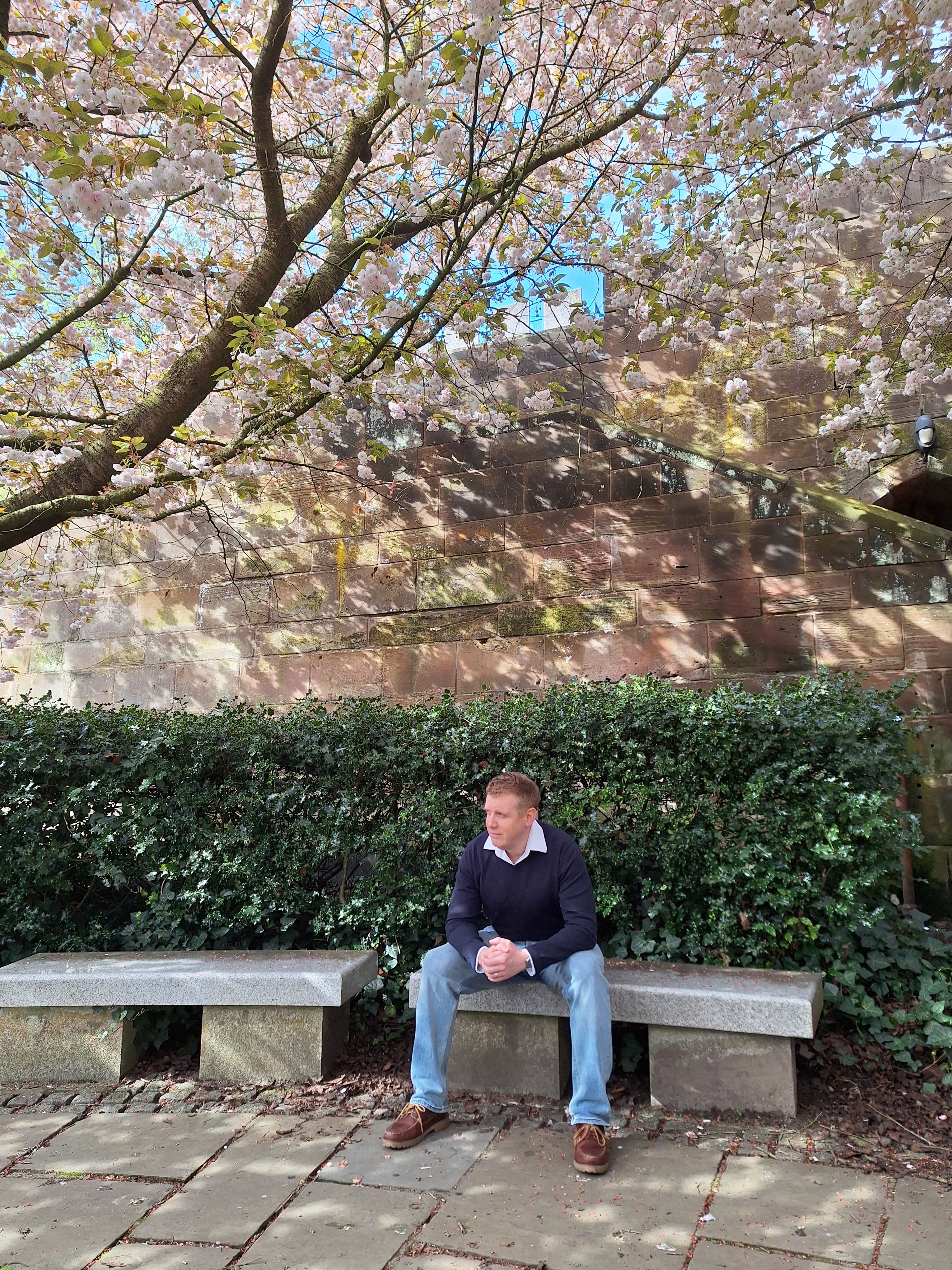Inspired By: Tom Pinfold
Protecting culture in conflict
Both a military man and a historian who's presented BBC TV shows, Tom Pinfold (Archaeology 2001) is now a key voice in safeguarding cultural heritage in warzones

Iwas born in Liverpool and grew up on the Wirral. My mum studied Old English and would read me Roman, Greek, Celtic and Norse myths, so it was an environment where there was a lot of interest in history, writing and culture. I was encouraged to ask questions. My dad was a solicitor – he could pick up lots of different things and funnel them into what’s important. I picked up a bit of that too. We had a sort of half-sandpit, half-mudpit behind the house – that was kind of my introduction to archaeology!
I went to boarding school, where my interest in the past continued to develop. I was taught Latin via Roman history. I was taken to Hadrian’s Wall a lot when I was young, and remember imagining how hard life would have been back then. Visiting historical sites can be a very emotive experience and give one a sense of self.
I also had an interest in the military, and military history - the Romans, Napoleonic Wars, Zulu War, the Second World War. My grandfathers both served during the Second World War and one of my grandmothers served in the Wrens – that might have sparked something in me.
"It was amazing to get to university and be properly challenged on my opinions and ideas."
I wasn’t originally going to go to university – I wanted to join the police. But my parents were keen that I go. When I looked through the UCAS book and saw archaeology as a degree, I just thought “that’s the one”. I was at UCL from 1998 to 2001 – it was a really good time. We dug a big Roman villa in year one. Then we went to a Roman site in Turkey and it was one of the most unbelievable experiences I’ve ever had. There were seven of us, good friends, sitting within a Roman city, in a valley, surrounded by snow-capped mountains. I haven’t experienced anything quite like it since. I also went to the Caribbean and did some Napoleonic-era digging in the Dutch Antilles.
At UCL I was taught to think differently. After 10 years at boarding school, where it runs on discipline and hierarchy, it was amazing to get to university and be properly challenged on my opinions and ideas. Professor John Wilkes and Tim Schadla-Hall, who passed away recently, were two of my key tutors – very different characters but both pushed me to not just accept what was out there.

It was also a very social course. People were encouraged to meet other people, talk to other people. I’ve taken a lot of that into later life. One of the people I met was Peter Ginn – he was in the year above me, but after I left UCL we ended up doing one of my first archaeology jobs together – staying in a B&B in Hampshire. Fast forward however many years and I’m godfather to one of his sons and he was one of the best men at my wedding. He was also responsible for me unexpectedly getting into television.
By 2007, Peter and I were good friends. I got a phone call from him asking if I was in work. I told him, “nothing I can’t get out of”. That led to me going to Shropshire to help him build a pigsty for the BBC’s Victorian Farm TV show. It was like going back to year one at UCL, doing experimental archaeology. Very surreal! I didn’t make it into the filming for that, but did have to dress up for some photos.
“It’s not about me, it’s about the subject.”
In 2013, when I was actually already in the Navy, I got another call. A TV producer had gotten my number from Peter. She asked if I wanted to try actual presenting. I thought it was a joke at first! I went to a screen test at an urban farm. There were three of us there – one was a now-famous presenter I’m not allowed to name. Peter’s advice was: “you’re not a television presenter, you’re an archaeologist who’s going to talk to the camera”. That changed my mindset. “It’s not about me, it’s about the subject.” And that’s how I got the job presenting with Peter, and with Ruth Goodman, on the BBC’s Tudor Monastery Farm. We teamed up again the following year for Secrets of the Castle.
The TV series were unique, positive experiences. I was a Royal Naval Reservist at the time – wearing a uniform. Then I put on medieval garb for the filming. Bouncing between those worlds was very strange! And I did get a lot of banter, from friends and colleagues in the military. They screened my debut in Tudor Monastery Farm in the Officer’s Mess, what the Navy calls the Wardroom. I was actually in another part of the building doing some work, but I could hear the laughter. But quite a few people said they ended up watching the whole series, when they would never normally have put it on. I’ll take the banter for that, promoting our past and displaying the skills and crafts that may disappear is so important.
Tom on the set of Tudor Mystery Farm
Tom on the set of Tudor Mystery Farm
With co-stars on set of Secrets of the Castle
With co-stars on set of Secrets of the Castle

I had thought about joining the military a few times growing up, but didn’t do it until 2011. I just really wanted to serve my country. I had moved back to the North West, so HMS Eaglet Royal Naval Reserve Unit in Liverpool was nearby. I believe I was one of the quickest people to go from walking through the door to being signed up. Being a Reservist quickly led me to full time work in the Navy.
When I became an officer, I moved into ‘Information Warfare’, and joined the Media Ops Specialisation – feeding the media stories about the Navy. My job was to communicate the good we were doing around the world, whether it’s counter-piracy, counter-drugs, humanitarian aid or whatever else. This created an understanding of narratives and their importance.
"As communities and nations, we are deeply connected to our cultural property and the worst time to realise how important it is when it’s gone."
My love of history and heritage has never gone away; in recent years, my focus has been on Cultural Property Protection during conflict. The term covers a whole raft of things – from buildings such as churches, mosques and castles to cultural objects and artwork. All of these things come under threat from warfare and the conditions that warfare creates.
As well as now being a trustee for the cultural property protection charity Blue Shield UK, I’m also a point of contact for the Royal Navy on these issues. This ties together my history background and my military background. I feel I’m on the first wave of a movement to bring cultural heritage into a broader military mindset. There’s a growing community of us working towards this goal. We would never say that cultural property matters more than human life, but it is a key enabler for fixing a society when a conflict has moved on. As communities and nations, we are deeply connected to our cultural property and the worst time to realise how important it is when it’s gone. It is a source of our individual, community and national identity.
I still draw on my experiences at UCL all the time. Being encouraged to think wider than you would do naturally, for instance; in the military we follow orders when we’re under pressure, but when we’re doing planning, thinking differently is essential. And I think I’m always willing to listen to other people’s opinions. That also came from UCL, where no-one was ever shut down for not being from a certain group or background. Being able to back up those opinions is really important though. These things feed into every aspect of my life, and I look back on my time at UCL with a lot of affection.

Portico magazine features stories for and from the UCL community. If you have a story to tell or feedback to share, contact advancement@ucl.ac.uk







